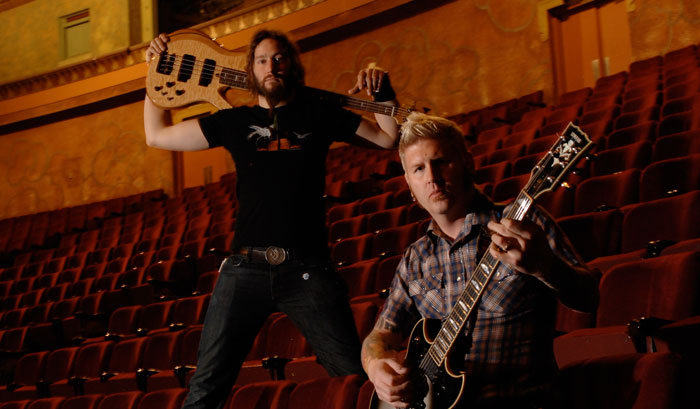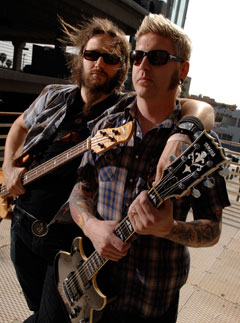


No one will ever accuse Mastodon of thinking small.
The Atlanta-based progressive metal band favors themes as large as the prehistoric pachyderm that inspired their name. Larger, actually--their 2004 release, Leviathan, was a sprawling adaptation of Herman Melville's Moby Dick. But Leviathan was merely a warm-up for their latest disc, Blood Mountain. It's a dark-fantasy concept album about a quest to retrieve a crystal skull and implant it in the band members' heads, thereby instigating the next phase of human evolution.
We want to sound big, clean, and raw at the same time -- awesome but polished. -Troy Sanders
"Ultimately, the story is about a single journey, one that metaphorically parallels our career as Mastodon," says bassist/vocalist Troy Sanders. "It makes perfect sense to us, though how it comes across to other listeners is open to interpretation."

Sanders and his bandmates--drummer BrŠnn Dailor and guitarists Bill Kelliher and Brent Hinds--don't mind hearing their music described as "progressive." "It's a good word," says Sanders. "We're all fans of the concept records that came before us. When done properly, a concept album feels like one unified piece of art. Every Iron Maiden album is like that. Every Pink Floyd album seems like one big thing from start to finish. Making themed records has helped us move in that direction."
Guitarist Kelliher perceives a conceptual kinship between Mastodon and current prog-metal groups such as the Mars Volta, Isis, and High on Fire. He argues that creating challenging, hard-to-pigeonhole music has actually expanded Mastodon's audience: "We can fit into a lot of different genres, and a lot of different people can enjoy it. There's something for everyone, from indie kids to metalheads to stoners to prog rock fans."
Despite Mastodon's grandiose themes, the band adheres to a stripped-down studio approach. "Some bands add lots of parts in the studio, and when they play the music live, it doesn't sound as good," notes Kelliher. "But we try to keep it as raw as possible. We go over things until we have them just right, but we try not to add any fakeness. I don't layer 50 million guitars. I just double some of my parts to beef them up."
"We want to maintain an organic sound," agrees Sanders. "We want to sound, big, clean, and raw at the same time--awesome, but polished. If there's room for something to be textured or layered while maintaining something close to its organic sound, we'll do it, but we don't layer things just to layer them. We've been a live band since day one, and we've always wanted our recordings to stay as true to our live sound as possible."
Like many modern metal bands, Mastodon often plays tuned-down instruments, dropping their strings anywhere from a whole step to a fifth. Sometimes bottom-heavy guitars of that sort leave no room for the bass, yet Troy's parts speak loud and clear. "If you can't hear the bass, why have it in the band?" he exclaims. "I like to be heard and felt, and Rich Costey, who mixed our record, was very aware of that. That was obviously something we paid a lot of attention to, recording-wise."
But there's more to it than mixology. "Troy tends to play around what the guitars are doing," Kelliher observes. "He definitely adds his own flavor in there."
"Yeah," nods Sanders. "I don't want to emulate everything they do. First, because I can't, and second, because it wouldn't diversify anything."
Sanders recently acquired three Yamaha basses: a TRB1004, a BB2004, and a BEX. "All three are very aesthetically pleasing right out of the box--they're easy on the eyes," he says. "I'm not a fan of neck-heavy guitars, but they were comfortable as soon as I strapped them on. And when I plugged them in, they sounded rich and warm with good presence."
Kelliher also recently scored a new Yamaha, a black SBG1000. "As soon as I opened the case, I flashed back on my first real guitar--an old black SG model from the '70s. I wish I still had it--it was one of the best guitars I ever owned! Actually, I usually play late-'70s and early-'80s guitars, but this new one is just beautiful, and it had a great feel right off the bat. It has a cool look, it's nice and heavy--"
"ĐĐand it sounds good!" interrupts Sanders.
Mastodon has been touring in support of Blood Mountain for over a year. "That means a year with no rehearsing, no jamming," says Sanders. "But we're all itching to start working on new material. We're bouncing some initial ideas off each other, just feeling out certain stories and riffs."
Any predictions about the results? "We'll definitely be taking it to the next level," vows Sanders. "But ultimately, we want to create what just about every band in the world wants to create: a ride, a series of emotions, something that flows together as one big piece."
























